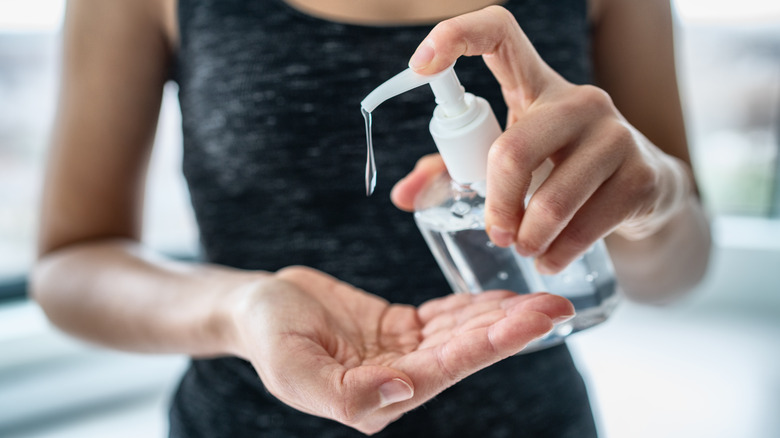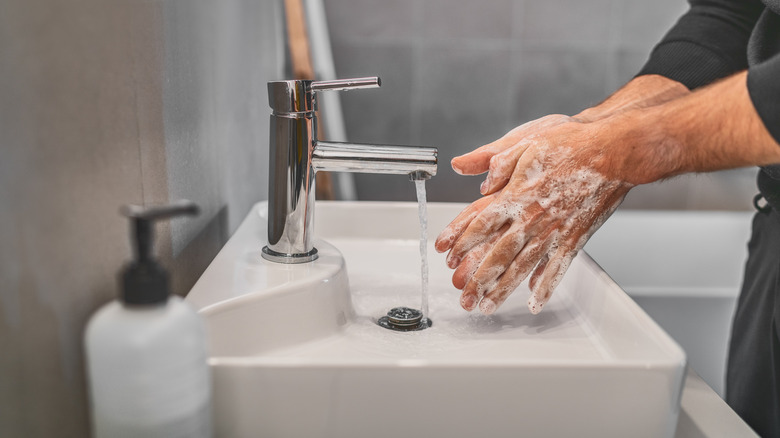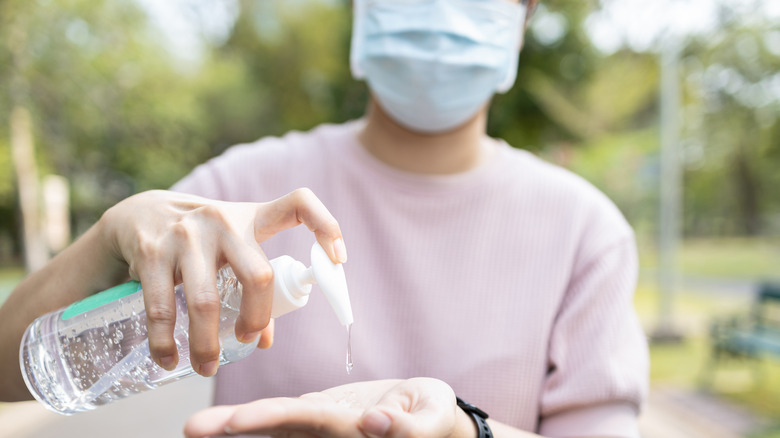Hand Sanitizing Is Not Effective For Cooking Safety. Here's Why
When you rank the most important things to keep in mind while making dinner, flavor is probably at the top of that list. However, there is another aspect of cooking that should trump even taste itself: cleanliness in the kitchen. It doesn't matter if you're dining on filet mignon and lobster tail over a bed of rare mushrooms; if a meal winds up making you or your guests sick, it will have been retroactively ruined. There are ways to tell when your food is spoiled or bad, but what about the germs that you're bringing to the metaphorical and literal table?
There are a lot of things you need to know to practice food safety. Some of the most important cleanliness rules pertain to handwashing. A thorough scrub with soap and water can be a great way to help prevent potentially harmful pathogens from developing in your kitchen.
You don't want to rely on utensils alone, as you will wind up lacking the complex dexterity required for certain cooking maneuvers. For instance, your hands are the key to the most flavorful potato salad, as they break apart the potatoes into craggy clumps, which are perfect for absorbing sauce. Just know that hand sanitizing, while undeniably an effective way to kill germs, cannot be used in lieu of handwashing when you're cooking.
Why is hand sanitizer less effective in the kitchen?
There are a number of reasons why using hand sanitizer is a worse way to keep your hands clean while cooking than the classic approach of scrubbing your dirty mitts with soap and water. For one, overusing hand sanitizer can affect your microbiome by killing off the potentially useful bacteria that live on your hands — what's the point of eating well if you don't have a healthy gut?
However, the primary benefit that soap and water have over hand sanitizer is their ability to clean a variety of materials from your hands. When a person is cooking, their hands will often become greasy with liquids that are potentially harmful to ingest, as well as other detritus, and hand sanitizer becomes a less effective decontamination agent when presented with these obstacles. Furthermore, hand sanitizer has proven to be less capable of removing certain chemicals. Perhaps most importantly, a large number of hand sanitizers cannot kill the dreaded norovirus, which is the suspect in the majority of food-sickness cases.
Is using hand sanitizer a healthy habit?
During the COVID-19 pandemic, squirt bottles filled with bubbly hand sanitizer, which were already a common fixture of public settings around the country, could suddenly be found everywhere. The market for hand sanitizer grew by a factor of six in 2020 (via Wall Street Journal).
Hand sanitizer can be a powerful guard against disease — just make sure that you choose a brand that is at least 60% alcohol by volume. You can strap a bottle of hand sanitizer to your keychain and always be prepared to wipe your hands of germs.
However, while hand sanitizer is useful when combating the pathogens that hide on surfaces — which is part of what made it so popular in the first place — it can't do much if anything to protect you against the germs that are being inadvertently transferred directly to you by friends, family, and strangers in all of your day-to-day interpersonal interactions. Nevertheless, hand sanitizer undeniably kills certain germs; so, outside of the kitchen, it doesn't hurt to have it around.


